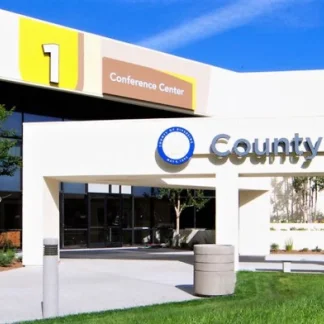A Peace of Mind Sober Living - Men's Home
A Peace of Mind Sober Living Men’s Home, located in Riverside, California, offer...
Riverside County Department of Mental Health – Wellness and Recovery Clinic is a public rehab located in Riverside, California that provides mental health and drug addiction recovery services to adults, seniors, and hearing-impaired persons. This drug rehab facility provides outpatient services and aftercare programs to help people with their recovery.
The outpatient program is designed for those suffering from a substance use disorder but do not need an on-site medical professional. Participants commute to the facility, where they attend individual and group therapy sessions. This facility primarily uses evidence-based behavioral therapies such as cognitive behavioral therapy (CBT), which identifies and changes destructive thought patterns.
Aftercare is provided to those who have completed their program. These resources aim to prevent relapse and include recovery education, support groups, and referrals to other professional services.
Riverside County Department of Mental Health – Wellness and Recovery Clinic accepts Medicare and private insurance providers. Some private insurance providers include Aetna, Amerigroup, United Healthcare, Ambetter, BlueCross/BlueShield, and Cigna. They may also accept coverage from providers like Humana, Beacon, Anthem, ComPsych, Magellan Health, and Kaiser Permanente. For out-of-network benefits, please contact your provider to verify coverage.
Contact us for more information: (951) 509-2400

Connect with Riverside County Department of Mental Health - Wellness and Recovery Clinic by calling their admissions team directly.
(951) 509-2400 Website Get DirectionsCognitive Behavioral Therapy (CBT) is a therapy modality that focuses on the relationship between one's thoughts, feelings, and behaviors. It is used to establish and allow for healthy responses to thoughts and feelings (instead of unhealthy responses, like using drugs or alcohol). CBT has been proven effective for recovering addicts of all kinds, and is used to strengthen a patient's own self-awareness and ability to self-regulate. CBT allows individuals to monitor their own emotional state, become more adept at communicating with others, and manage stress without needing to engage in substance abuse.
Group therapy is any therapeutic work that happens in a group (not one-on-one). There are a number of different group therapy modalities, including support groups, experiential therapy, psycho-education, and more. Group therapy involves treatment as well as processing interaction between group members.
In individual therapy, a patient meets one-on-one with a trained psychologist or counselor. Therapy is a pivotal part of effective substance abuse treatment, as it often covers root causes of addiction, including challenges faced by the patient in their social, family, and work/school life.
Trauma therapy addresses traumatic incidents from a client's past that are likely affecting their present-day experience. Trauma is often one of the primary triggers and potential causes of addiction, and can stem from child sexual abuse, domestic violence, having a parent with a mental illness, losing one or both parents at a young age, teenage or adult sexual assault, or any number of other factors. The purpose of trauma therapy is to allow a patient to process trauma and move through and past it, with the help of trained and compassionate mental health professionals.
Group therapy is any therapeutic work that happens in a group (not one-on-one). There are a number of different group therapy modalities, including support groups, experiential therapy, psycho-education, and more. Group therapy involves treatment as well as processing interaction between group members.
In individual therapy, a patient meets one-on-one with a trained psychologist or counselor. Therapy is a pivotal part of effective substance abuse treatment, as it often covers root causes of addiction, including challenges faced by the patient in their social, family, and work/school life.
Trauma therapy addresses traumatic incidents from a client's past that are likely affecting their present-day experience. Trauma is often one of the primary triggers and potential causes of addiction, and can stem from child sexual abuse, domestic violence, having a parent with a mental illness, losing one or both parents at a young age, teenage or adult sexual assault, or any number of other factors. The purpose of trauma therapy is to allow a patient to process trauma and move through and past it, with the help of trained and compassionate mental health professionals.
In individual therapy, a patient meets one-on-one with a trained psychologist or counselor. Therapy is a pivotal part of effective substance abuse treatment, as it often covers root causes of addiction, including challenges faced by the patient in their social, family, and work/school life.
Trauma therapy addresses traumatic incidents from a client's past that are likely affecting their present-day experience. Trauma is often one of the primary triggers and potential causes of addiction, and can stem from child sexual abuse, domestic violence, having a parent with a mental illness, losing one or both parents at a young age, teenage or adult sexual assault, or any number of other factors. The purpose of trauma therapy is to allow a patient to process trauma and move through and past it, with the help of trained and compassionate mental health professionals.
Trauma therapy addresses traumatic incidents from a client's past that are likely affecting their present-day experience. Trauma is often one of the primary triggers and potential causes of addiction, and can stem from child sexual abuse, domestic violence, having a parent with a mental illness, losing one or both parents at a young age, teenage or adult sexual assault, or any number of other factors. The purpose of trauma therapy is to allow a patient to process trauma and move through and past it, with the help of trained and compassionate mental health professionals.
A Peace of Mind Sober Living Men’s Home, located in Riverside, California, offer...
Inland Empire Teen Challenge is a drug and alcohol rehab located in Riverside, C...
Pacific Manor Recovery is located in Riverside, California, and offers mental he...
Riverside Comprehensive Treatment Center is a private rehab located in Riverside...